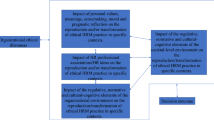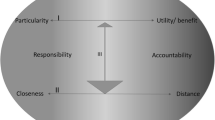Abstract
Whilst there is a growing volume of literature exploring the ethical implications of organisational change for HRM and the ethical aspects of certain HRM activities, there have been few published U.K. studies of how HR managers actually behave when faced with ethical dilemmas in their work. This paper seeks to enhance the foundations of such knowledge through an examination of the influence of organisational values on the ethical behaviour of Human Resource Managers within a sample of charities in the U.K. and the Republic of Ireland. A qualitative research design is adopted utilising semi-structured interviews. Findings highlight ethical inconsistency in people management in the charity sector arising from the clear application of strong and explicit organisational values to external client groups but their limited influence on people management strategies and practices within the organisation. Many of the ethical issues faced by HRM professionals in both countries arise from this inconsistency. In their handling of ethical dilemmas, the HRM professionals exhibit a combination of a care ethic and a concern for justice but it is also clear that in situations of management intransigence, a desire to be conscience driven often gives way to a contingent approach. Whilst respondents considered it inappropriate for the HRM function to be the conscience of the organisation, it is seen to have a key role in providing management with advice on ethical action. However, the ability of HRM to influence ethical behaviour is highly dependent on the status of the function within the organisation.
Similar content being viewed by others
References
Armstrong, M.: 1992, ‘A Charitable Approach to Personnel', Personnel Management 24(12), 28–32.
Baker, B. and J. Cooper: 2000, ‘Occupational Testing and Psychometric Instruments', in D. Winstanley andJ. Woodall (eds.), Ethical Issues in Contemporary Human Resource Management (Macmillan, Basingstoke), pp. 59–84.
Blum, L. A.: 1988, ‘Gilligan and Kohlberg: Implications for Moral Theory', Ethics 98, 472–491.
Connock, S. and T. Johns: 1995, Ethical Leadership (IPD, London).
Chryssides, G. and J. Kaler: 1996, Essentials of Business Ethics (McGraw-Hill, Maidenhead).
Dartington, T.: 1996, ‘Leadership and Management: Oedipal Struggles in Voluntary Organisation s', Leadership and Organisational Development Journal 17(6), 12–17.
Foote, D. and I. Robinson: 1999, ‘The Role of the Human Resources Manager: Strategist or Conscience of the Organisation?', Business Ethics A European Review 8(2), 88–98.
Gilligan, C.: 1993, In a Different Voice (HUP, Massachusetts).
Handy, C.: 1988, Understanding Organisations (Penguin, London).
Hannaway, C.: 1992, ‘Why Irish Firms are Smiling', Personnel Management 24(5), 38–41.
Hargreaves, B.: 1975, Policy for Responsibility (Foundation for Business Responsibility, London).
Hudson, M.: 1995, Managing Without Profit-The Art of Managing Third Sector Organisations (Penguin, London).
Huselid, M.: 1995, ‘The Impact of Human Resource Management Practices on Turnover, Production and Corporate Financial Performance', Academy of Management Journal 38, 635–642.
Kohlberg, L.: 1981, Essays on Moral Development. Vol. 1: The Philosophy of Moral Development (Harper and Row, San Francisco).
Legge, K.: 1988, ‘Personnel Management in Recession and Recovery: A Comparative Analysis of What the Surveys Say', Personnel Review 17(2), monograph issue.
Legge, K.: 1995, HRM: Rhetorics and Realities (Macmillan Business, London).
Lowe, J.: 1992, ‘Locating the Line: the Front Line Supervisor and HRM', in P. Blyton andP. Turnbull (eds.), Reassessing HRM (Sage, London), pp. 148–168.
Miller, P.: 1996, ‘Strategy and the Ethical Management of Human Resources', Human Resource Management Journal 6(1), 5–18.
NCVO: 1998, The NCVO Survey of Job Roles and Salaries in the Voluntary Sector 1997/98.
Purcell, J. and S. Hutchinson: 1996, ‘Lean and Mean?', People Management (October), 27–33.
Sadler, T.: 1995, HRM: Developing a Strategic Approach (Kogan Page, London).
Saunders, M., P. Lewis andA. Thornhill: 1997, Research Methods for Business Students (Pitman, London).
Society for Human Resource Management/ Commerce Clearing House, Inc.: 1991, Human Resources Management, 1991 SHRM/CCH Survey, Part II (Commerce Clearing House, Inc., Chicago, IL), June 26, pp. 1–12.
Society for Human Resource Management/Ethics Resource Center: 1997, Business Ethics Survey Report (SHRM/ERC, Alexandria).
Smith, J. and J. Hasnas: 1999, ‘Ethics and Information Systems: the Corporate Domain', MIS Quarterly 23(il), 109–132.
Snell, R. S.: 1996, ‘Complementing Kohlberg: Mapping the Ethical Reasoning Used by Managers for Their Own Dilemma Cases', Human Relations 49(1), 23–27
Spence, L.: 2000, ‘What Ethics in the Employment Interview?', in D. Winstanley andJ. Woodall (eds.), Ethical Issues in Contemporary Human Resource Management (Macmillan, Basingstoke 5), pp. 43–58.
Third Sector Foresight Conference: 1998, ‘A Report on the Third Sector Conference', 15 May. U.K. Voluntary Sector Almanac 1998–99 (NCVO, London).
Ulrich, D.: 1997, Human Resource Champions ( Harvard Business School Press, Harvard).
Vallance, E.: 1999, ‘Sleeping with the Enemy or Learning From Each Other? Sharing Ethical Experiences Between the Public and Private Sectors', Long Range Planning 32(2), 199–206.
Von Prondzynski, F.: 1998, ‘Ireland: Corporatism Revisited', in A. Ferner andR. Hyman (eds.), Changing Industrial Relations in Europe (Blackwell, Oxford), pp. 55–73.
Wiley, C.: 1998, ‘Re-examining Perceived Ethics Issues and Ethics Roles Among Employment Managers', Journal of Business Ethics 17(2), 147–161.
Winstanley, D. and J. Woodall (eds.): 2000, Ethical Issues in Contemporary Human Resource Management (Macmillan, Basingstoke).
Winstanley, D., J. Woodall andE. Heery: 1996, ‘Business Ethics and Human Resource Management Themes and Issues', Personnel Review 25(6), 5–12.
Woodall, J. and D. Douglas: 2000, ‘Winning Hearts and Minds: Ethical Issues in Human Resource Development', in D. Winstanley andJ. Woodall (eds.), Ethical Issues in Contemporary Human Resource Management (Macmillan Basingstoke), pp. 116–136.
Woodd, M.: 1997, ‘Human Resource Specialists-Guardians of Ethical Conduct?', Journal of European Industrial Training 21(2–3), 110–107.
Author information
Authors and Affiliations
Rights and permissions
About this article
Cite this article
Foote, D. The Question of Ethical Hypocrisy in Human Resource Management in the U.K. and Irish Charity Sectors. Journal of Business Ethics 34, 25–38 (2001). https://doi.org/10.1023/A:1011909904150
Issue Date:
DOI: https://doi.org/10.1023/A:1011909904150




